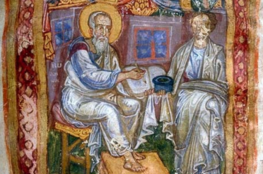This week’s list of links is rather lengthy. Enjoy.
- Rod Dreher, “The Ghosts of Colson & Neuhaus,” American Conservative – I am not an American Conservative frequent flyer, so forgive me for being a tad late on this one. In this post, Dreher summarizes and reviews a recent private conference hosted by First Things (FT) to “discuss the future of religion in the public square[.]” Dreher was one of the three participants at the gathering to deliver a paper. (All three will be published in a forthcoming issue of FT.) Without naming names, Dreher runs down some of the “highlights” of the discussions which took place that day, which, I suspect, won’t be making their way into FT. I, of course, have mixed feelings about all of this. While I remain strenuously opposed to the Catholic brand of neoconservatism FT promoted during the 1990s and 00s, I am skeptical that the “radical Catholicism” certain academics and youngsters are starting to cling to these days is the answer either. As Dreher recounts, one younger participant at the FT conference noted that much of the discussion about the future of religion and politics in America is pitched at a highly theoretical level. It seems some people have forgotten that there was a time, not terribly long ago, when the Church spoke forcefully to her flock and the world at large in clear language without vagaries and jargon. It’s notable that none of the discussion — at least as recounted by Dreher — made a single mention of the social rights of Christ the King and the duties of the state to God. One wonders if any event sponsored by FT could ever get out from under the banner of liberalism.
- Eric Jobe, “The Masoretic Hebrew vs. The Septuagint (Part 1),” Departing Horeb – Eric Jobe is a friend and former co-religionist of mine who is on the closing lap of his PhD at the University of Chicago. His web-log, Departing Horeb, focuses on Biblical studies from an Orthodox and academic perspective. Back in the good old days Eric and I would have a few rounds over Biblical criticism, the authority of the Septuagint (LXX) in Orthodoxy, the utility of Orthodox priests knowing Biblical Hebrew, etc. While I never admitted it publicly, Eric — along with several others (including my wife, who has her M.A. in Biblical Studies from Chicago) — eventually won me over to “their side” if by “their side” we mean “not reading the Scriptures like a fundamentalist Protestant.” It’s not that I wanted to read the Bible that way, but Orthodoxy — at least in its American manifestation — is beset by a rather narrow, fundamentalist, approach to Biblical exegesis; people just like to call it “Orthodox” or “ancient,” when it is neither. If you don’t believe me, then let me suggest you peruse the lengthy combox of Jobe’s post. There you will find a sparring match, nay, a bloodbath between two Orthodox clerics. In the first corner is the polyglot Fr. Patrick Henry Reardon, who studied at St. Anselm’s College and the Pontifical Biblical Institute in Rome, and has written numerous books on the Scriptures for a primarily lay audience. In the second corner is Fr. John Whiteford, a man who has been not inaptly described as “The Elmer Fudd of Orthodoxy.” You don’t want to miss it.
- David Pusztai, “MH17 Goes to Strasbourg,” European Journal of International Law Blog – In the wake of the Malaysian Airlines shoot-down in Ukraine, I had written a series of blog posts discussing the international legal issues surrounding the tragedy. (For those interested, they are here, here, here, and here.) I remain generally interested in the matter, and so I was glad to find some fresh commentary on the news that the German victims’ families plan to press for reparations from Ukraine before the European Court of Human Rights. That is a compensatory route I had not contemplated in my earlier posts, mainly because that is not one of the usual forums for pressing a liability claim related to civil aviation. From a “legalist perspective” (which is always vague), I am skeptical that the claim will succeed, but this is international law, and international law is just politics by other means.
- Fr. John Hunwicke, “Update,” Mutual Enrichment – There are several unsettling reports emerging from the ongoing “Extraordinary Synod on the Family” along with a flood of secondary commentary either defending or reinterpreting these reports and what they may (or may not) mean for the future of the Catholic Church. Fr. John Hunwicke, with humor and precision, cuts through it all with three simple and effective questions.
- Christopher Ferrara, “The Secret Synod Freak Show, Brought to You by Pope Francis,” The Remnant – A couple of weeks ago I noted that Christopher Ferrara has “dropped the gloves” with respect to the current Pontificate. This is his latest strike. The tone is not edifying, but that doesn’t mean the substance of his criticisms are untrue. While I would prefer traditional Catholics take a slightly softer approach when assessing both the Pope and the neo-Catholic establishment, I understand and sympathize with most of Ferrara’s frustrations. It doesn’t take a crystal ball to see that change is coming. The answered questions remain, “What sort of change and how much?” Whatever the answer, it is highly doubtful that it will be change for the better. The Church is undergoing a “retro moment.” It’s the 1970s all over again.



